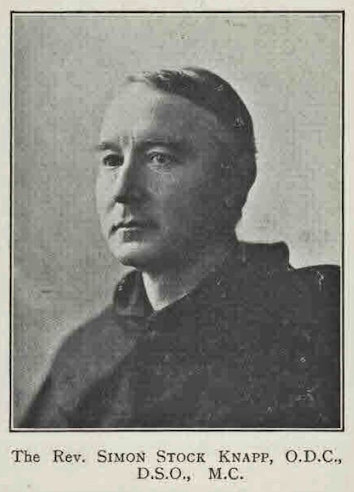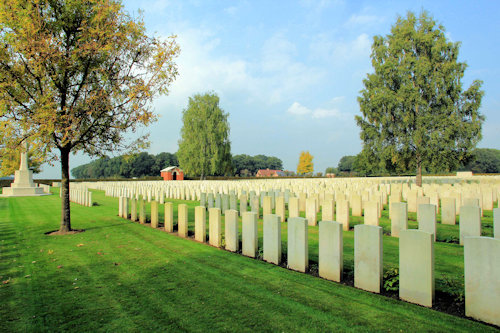Name
Simon Stock Knapp (CF, ODC, DSO, MC)
Conflict
First World War
Date of Death / Age
01/08/1917
Rank, Service Number & Service Details
Chaplain 3rd Class
Army Chaplains' Department
Awards: Service Medals/Honour Awards
Not Yet Researched
Distinguished Service Order, Military Cross
Cemetery/Memorial: Name/Reference/Country
DOZINGHEM MILITARY CEMETERY
II. C. 1.
Belgium
Headstone Inscription
Not Researched
UK & Other Memorials
St Edmunds College Memorial, Old Hall Green
Biography
The following text was transcribed from The Edmundian (1914-1919) – The contemporary magazine of St Edmund’s College:
FRANCIS KNAPP, CF., D.S.O., MC (FATHER SIMON STOCK OF THE HOLY FAMILY, O.D.C.)
The bond of real affection which unites Edmundian clergy and laity, begun and strengthened through school-boy days, has once more been consecrated in blood. In our last number we told of the gallant death of one of our most loved secular priests, Father Herbert Collins. To-day we have a like story to tell of a Religious, Father Simon Stock of the Holy Family. It is a painful task, but one of splendid augury, to tell how together, on the same field of honour, members, not only of the laity but also of the Secular and Regular Clergy have died, and all so nobly that their friends hold them all in equally proud memory.
Francis Knapp was here "before our item;" and if we are of the same school and of the same spirit, the epoch matters nothing. He was a student here in the "seventies." In 1878 he left St. Edmund's to enter the Carmelite order, and, if we may so put it, began his wanderings. At Lyons in that year he took his first vows; next year laws passed against his profession sent him back to England; his next pied a terre was Ghent, where he was ordained priest in 1883. In 1884 he took the combined task of sub-prior, master of students, and lecturer in philosophy at the new house at Wincanton, being peculiarly fitted for this work, in everything except only as it soon proved in health. For a time after this unhappy discovery he was chaplain at the Marquis of Bute's Cathedral Church at Rothesay, returned thence to London, went to the United States and back, and then went for a year to Mount Carmel. On his return thence he seemed to be doomed to be a chronic invalid for the rest of his days. But he was to find peace of body and nerves, surprising though it indeed is, in War's alarms.
He accepted a military chaplaincy at the time of the Boer War, and had found his métier. The open air and the exercise, the weeks of trekking and "roughing it" generally, made him forget, for the time at any rate that he had been an invalid. During the first year (he engaged himself for a year at first) he did wonders in his work, and he was urged to continue for another year. He consented; and his work spoke for itself without any need of the mentions in despatches(sic) and the medals by which authorities expressed their recognition. In 1901 he returned from war to London, where almost at once he found the pursuits of peace too much for him. There were outbursts of energy paid for in long periods of irksome idleness, spent chiefly in Spain.
The outbreak of war was a chance of happy and nobly risky work that was too good to be missed. With all possible speed he entered the Service again, this time more keen than ever, thanks to the long inactivity which must have chafed sorely.
In this his second and last period of military work, he spent all but three years attached to the Irish Guards. Quite early he received the Military Cross; more recently he received the D.S.O. and with it the rank of Major.
He had, as his photographs show him to have had, a kindly face and gentle, with a deal of sweet mirth lurking indefinably but unmistakably about the eyes, and with a refined strength about the mouth. We see even in his likeness, the sympathy and understanding of one who has suffered, and would spare his brother-men from any harm at whatever cost. It is a face too which speaks, not weakly, but straight, of holiness. Such was Father Knapp to look upon, and such, as we know, he always was in his dealings with the men and with his fellow officers. These last, in letters wherein words are not wasted, wherein polite formulae have no place, tell "how we all liked Father Knapp, what a brave man he was and, above all, what a tremendous influence for good he was to us all." They have "lost a good friend and comrade, and from the military point of view, an influence which can never be replaced. He was loved by the men and he had them in great control." He died, and neither he nor his friends would have wished it otherwise, at his work. There was in him a feeling that the end was near; with a boyish humour in it all he wrote of monuments, and of his monument which was to be a thing of the near future. His "boys," who are brave themselves, and know that bravery is but part of their usual work, found inspiration in his fearlessness. No risks, however frightful, no dissuasion, however earnest, could hold him back or delay his departure on his duty of consolation to the dying. He was mortally wounded by a piece of shell. All he said when he was hit a brother officer tells us was "It's come at last."
"Poor old Father" continues the same officer, "he knew he was going to die, but be was quite ready and so fully prepared that one can scarcely be sorry." It is a life full of suggestiveness. The good student and keen cricketer; doomed to the life of the hypochondriac, until the horrors of war restored to him his energies, so that he found the joy of the cricket field, and something greater and deeper too, on the field of battle, and at the end, interrupting him at his work, that long expected call, which "came at last." "No, one can scarcely be sorry."
Acknowledgments
Jonty Wild, Di Vanderson, The Edmundian (1814-1819) – The contemporary magazine of St Edmund’s College



